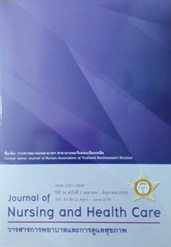ปัจจัยทำนายพฤติกรรมการรับประทานอาหารของผู้เป็นเบาหวานชนิดที่ 2 ในโรงพยาบาลมหาวิทยาลัยแคนเทอ ประเทศเวียดนาม Factors Predicting Eating Behavior among Persons with Type 2 Diabetes in Can Tho University Hospital, Vietnam
คำสำคัญ:
เบาหวานชนิดที่ 2 พฤติกรรมการรับประทานอาหาร type 2 diabetes, eating behaviorบทคัดย่อ
การศึกษานี้เป็นการศึกษาเชิงบรรยายมีวัตถุประสงค์เพื่อศึกษาปัจจัยทำนายพฤติกรรมการรับประทานอาหาร
ของผู้เป็นเบาหวานชนิดที่ 2 ในโรงพยาบาลมหาวิทยาลัยแคนเทอ ประเทศเวียดนาม ปัจจัยที่เลือกสรร ประกอบด้วย
ความรู้เกี่ยวกับอาหารเบาหวาน ความตระหนักในการควบคุมอาหาร ความรอบรู้ด้านสุขภาพ และรายได้ กลุ่ม
ตัวอย่างเป็นผู้เป็นเบาหวานชนิดที่ 2 ที่มารับการรักษาที่แผนกผู้ป่วยนอก โรงพยาบาลแคนเทอ ประเทศเวียดนาม
จำนวน 82 ราย ที่คัดเลือกโดยการสุม่ อยา่ งงา่ ย เก็บรวบรวมขอ้ มูลดว้ ยแบบสอบถามจำนวน 5 แบบสอบถาม ระหวา่ งเดือนกรกฎาคม ถึงกันยายน พ.ศ. 2558 วิเคราะห์ข้อมูลใช้สถิติเชิงบรรยาย และสถิติถดถอยพหุคูณ ผลวิจัยพบว่ากลุ่มตัวอย่างมีอายุเฉลี่ย 49.51 ปี (SD = 8.19) ส่วนใหญ่เป็นเพศหญิง (ร้อยละ 64.2) สถานภาพสมรสคู่ (ร้อยละ82.7) ประกอบอาชีพมีรายได้ (ร้อยละ 77.8%) และสำเร็จการศึกษาระดับมัธยมศึกษา (ร้อยละ 40.7%) เป็นโรค
เบาหวานมาได้นานเฉลี่ย 5 ปี (SD= 4.35) มีโรคร่วมส่วนใหญ่เป็นความดันโลหิตสูง (ร้อยละ 42) รับการรักษาโรค
เบาหวานด้วยยา (ร้อยละ 98.8) มีระดับนํ้าตาลในเลือดเฉลี่ย 137.5 มก/ดล (SD= 18.1) กลุ่มตัวอย่างมีระดับความรู้เกี่ยวกับอาหารเบาหวาน ความตระหนักในการควบคุมอาหาร ความรอบรูด้ า้ นสุขภาพ และพฤติกรรมการรับประทานอาหารอยู่ในระดับปานกลาง ผลการวิเคราะห์สถิตถดถอยพหุคูณพบว่า ความตระหนักในการควบคุมอาหาร
(β = .46, p < .001) ความรู้เกี่ยวกับอาหารเบาหวาน (β = .30, p < .05) และความรอบรู้ด้านสุขภาพ (β = .18,p < .05) เปน็ ปจั จัยที่มีอิทธิพลและสามารถรว่ มกันทำนายพฤติกรรมการรับประทานอาหารของผูเ้ ปน็ เบาหวานชนิดที่ 2 ได้ร้อยละ 65.1 ผลการศึกษานี้เสนอแนะว่าโปรแกรมการพยาบาลสำหรับส่งเสริมพฤติกรรมการรับประทานอาหารของผู้เป็นเบาหวานชนิดที่ 2 ควรประกอบด้วย กิจกรรมที่ส่งเสริมความตระหนักในการควบคุมอาหาร ความรู้เกี่ยวกับอาหารเบาหวานและความรอบรู้ด้านสุขภาพ
This predictive correlational study aimed to explore factors predicting eating behavior among persons with type 2 diabetes in Can Tho University Hospital, Vietnam. The factors included knowledge of diabetic diet, patients’ awareness for diet control, health literacy, and income. A random sample of persons with type 2 diabetes receiving care at Medical Outpatient Clinic, Can Tho University Hospital, Vietnam was recruited in the study. Five self-report questionnaires were used to collect data during July to September 2015. Data were analyzed using descriptive statistics and multiple regression analysis. The results showed that the mean of age of participants was 49.51 years old (SD = 8.19). Most of them were females (64.2),were married (82.7%), were employed (77.8%), and completed a secondary school (40.7%). Participants had mean diabetes duration of 5 years (SD= 4.35) and the most common co-morbidity was hypertension (42%). Nearly all participants (98.8%) controlled blood glucose by oral medication. The average fasting blood glucose was 137.5 mg/dl (SD= 18.1). The mean score of knowledge of diabetic diet, atients’ awareness for diet control, health literacy, and eating behavior were at a moderate level. Results of
multiple regression analysis showed that patients’ awareness for diet control (β = .46, p< .001), knowledge of diabetes diet (β = .30, p< .05), and health literacy (β = .18, p< .05) could predict eating behavior which altogether explained 65.1% of variance of eating behavior among T2D persons. The findings of this study suggest that nursing intervention programs target at awareness of diet control, knowledge of diabetic diet,and health literacy should be recommended for improving eating behavior of people with type 2 diabetes.


